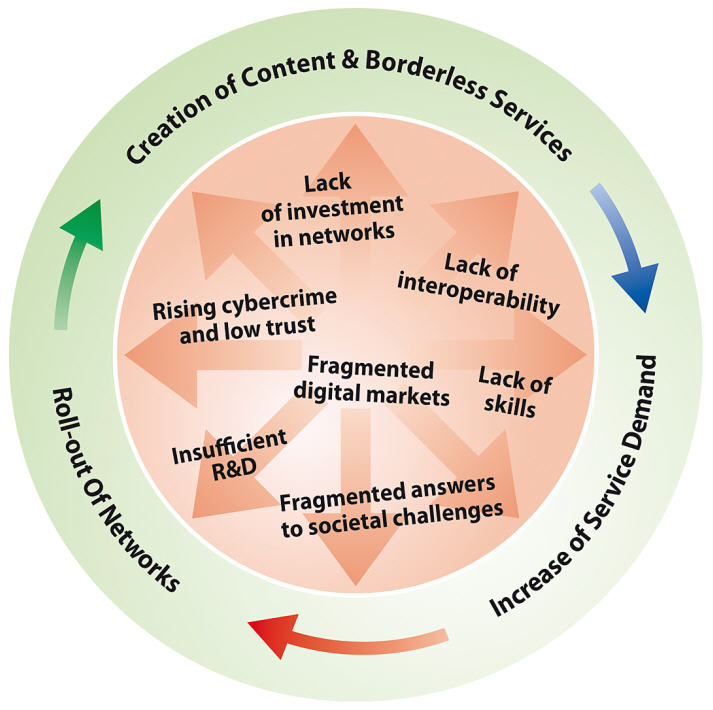Obstacles to the virtuous cycle of the digital economy 
This great potential of ICT can be mobilised through a well-functioning virtuous cycle of activity. Attractive content and services need to be made available in an interoperable and borderless internet environment. This stimulates demand for higher speeds and capacity, which in turn creates the business case for investments in faster networks. The deployment and take-up of faster networks in turn opens the way for innovative services exploiting higher speeds.
This flow of activity can be largely self reinforcing. It requires a business environment that fosters investments and entrepreneurship. But while the transformational power of ICT is clear, serious challenges must also be confronted in order to harness it. But while the transformational power of ICT is clear, serious challenges must also be confronted in order to harness it. Although a digital way of life is emerging for many European citizens, on the basis of technology which declares its “worldwide”, borderless reach, they cannot accept that a single market designed before the internet is still seriously incomplete online. People’s enjoyment of digital technologies, be it as citizens, consumers or workers, is marred by privacy and security concerns, by insufficient internet access, insufficient usability, by lack of relevant skills or by lack of accessibility for all. Europeans are frustrated when ICT do not deliver their promise of better public services. They are concerned that, as the internet has accelerated competition for investments, jobs and economic influence at a global level, Europe is not equipping itself adequately to prosper in this growth sector of the knowledge economy.
Based on consultation with stakeholders and on the insights contained in both the Granada Declaration and the European Parliament Resolution, the Commission has identified the seven most significant obstacles. On their own or in combination, these obstacles seriously undermine efforts to exploit ICT, making clear the need for a comprehensive and united policy response at the European level. They show that Europe is lagging behind its industrial partners. Today there are four times as many music downloads in the US as in the EU because of the lack of legal offers and fragmented markets; 30% of Europeans have still never used the internet; Europe has only 1% penetration of fibre-based high-speed networks whereas Japan is at 12% and South Korea is at 15%; and EU spending on ICT research and development stands at only 40% of US levels.
The Digital Agenda for Europe frames its key actions around the need to systematically tackle these seven problem areas, which as a horizontal initiative spans, the three growth dimensions set out in Europe 2020. These problem areas demonstrate the pressing need for the actions identified as a set of positive agendas to boost Europe’s social and economic performance. The Commission will remain vigilant for the emergence of additional obstacles and will react accordingly.
The Digital Agenda will require a sustained level of commitment at both EU and Member State levels (including at regional level). It cannot succeed without a major contribution by other stakeholders, including young “digital natives” who have much to teach us. This Agenda is a snapshot of actual and foreseeable problems and opportunities, and will evolve in the light of experience and of the rapid changes in technology and society.